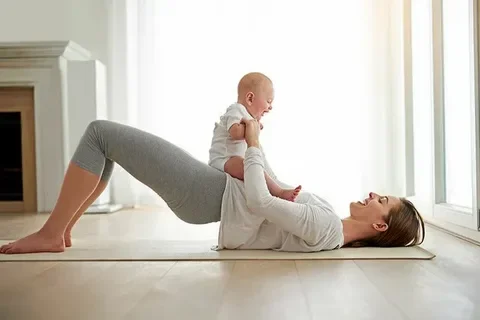Introduction TO Postpartum Weight Loss

The touchy topic for many new moms: postpartum weight loss. After nine long months of pregnancy changes, let alone the life-altering experience of childbirth, there’s a natural instinct to feel like one’s old self again. Still, losing that baby weight is all about feeling great-not looking good-and boosting energy while nurturing health through this new chapter called motherhood.
Here’s 8 Things You Need To On How To Approach Postpartum Weight Loss
- Give Yourself Grace and Time
First off, it needs to be said that your body just came through an amazing process of bringing life into the world. It took nine months to gain Postpartum Weight Loss, so it is okay if it takes time to lose it. Rushing into a strict regime of losing weight too early can interfere with recovery and also affect breastfeeding. Experts advise not starting any structured Postpartum Weight Loss or exercise regime until at least six weeks after delivery, and longer if you had a C-section. Go easy, and take the time your body needs to heal and readjust. - Focus on Nourishment, Not Deprivation
When it comes to postpartum Postpartum Weight Loss, the focus should be on nourishment for the body rather than a calorie deficit. This is where a well-rounded diet packed with nutrients would help with healing and recuperating your energy while doing your daily chores and also gives you an assurance of good milk supply during lactation. Here are a few nutritional tips to remember:- Whole foods like vegetables, fruits, whole grains, lean proteins, and healthy fats.
- Stay well-hydrated with plenty of water intake, more so if you are breastfeeding.
- Avoid foods that are high in sugar and saturated fats. These types of foods can raise the incidence of energy dips and mood swings.
- Eat small frequent meals to keep the energy levels stable and to avoid hunger pangs.
- Breastfeeding and Weight Loss
One question which works on the mind of every new mom is whether breastfeeding may help in Postpartum Weight Loss. And most of the time, the answer is a resounding yes. Breastfeeding does require more calories since your body is using up your energy to produce milk. For many women, this means they start losing weight very gradually. Yet, every body is different and may not have obvious changes in weight through breastfeeding. It is worth mentioning here that while breastfeeding, one must not severely cut the calorie intake with the hope of losing weight quickly. Instead, feed well to be able to feed well. - Start with Easy Workouts
Exercise is great in postpartum recovery, but it must be eased into the first couple of weeks. When you are given the go-ahead by your doctor, start with low-impact exercises that rebuild strength and stamina. Here are just a few of the great options that are friendly for postpartum:- Walking: Perhaps one of the best and easiest ways to get back into exercising. Short walks can become longer as you build up your endurance.
- Postpartum yoga or Pilates: These light exercises will gently engage in strengthening your core, making you more flexible, and even help with your mental well-being.
- Kegel exercises: It is important to strengthen your pelvic floor after having a baby. You can do Kegels anywhere without any equipment.
- Postnatal fitness classes: Many gyms and studios offer postnatal fitness programs that are designed to cater specifically to new moms.
- Remember, the idea is not to over-exercise but to build up gradually.
- Strengthen Your Core Safely
Your abdominal muscles have stretched due to carrying your baby throughout pregnancy. Many women during this time develop something called diastasis recti, which is basically a separation of the ab muscles. If you do have that, you’ll want to pay extra attention to your core exercises to not further the condition. It is recommended for the best course of action to go to a postpartum specialist or physical therapist so that you may safely work on rebuilding your core without making things worse with some sit-ups or crunches. - Sleep as Much as You Can!
While sleep may be the last thing on your mind when you have a newborn, it’s imperative to get rest when you can. Sleep deprivation is going to disturb Postpartum Weight Loss, playing chaos with hunger hormones and making energy levels low-so making it very difficult to adhere to healthy habits. Take advantage of time to rest, nap when your baby naps, and don’t be afraid to ask family and friends for help as you try to get some extra sleep. Remember, taking care of oneself is important. - Manage Stress
The post-delivery phase is a stressful phase, which can become an obstacle to your fight against Postpartum Weight Loss. Stress hormone, cortisol in large quantities, may lead to bloating and deposition of fat within the abdominal cavity. Engage in stress-releasing techniques like deep breathing, meditation, or just relaxing moments with your baby to keep you free from stress and maintain better health in general. - Be Consistent, but Don’t be too Hard on Yourself
The key to postpartum Postpartum Weight Loss is consistency. Find yourself a good routine, but on the same note, try giving yourself some slack when life with a new baby gets so out of routine. Overwhelming days are going to happen, and that’s okay; your health journey doesn’t have to be perfect. Celebrate small victories along the way, whether fitting in a 10-minute walk or choosing a healthy snack.
How Much Weight Do You Lose Immediately After Birth?

The American College of Obstetricians and Gynecologists or ACOG estimates a normal weight gain for women and pregnant persons of normal weight to be approximately between 25 to 35 pounds to support normal fetal development during pregnancy. You’ll lose some of this weight automatically after birth. So, how much weight is lost after birth? “Most women lose about 10 to 15 pounds right away, due to the baby, placenta and water weight,” says Cynthia Flynn, MD, a Florida-based ob-gyn with Just answer.
That said, you’ll likely still have a “bump” after childbirth. According to the Cleveland Clinic, it’ll take around six weeks for your uterus to shrink back down, and you may have a bulge in the meantime.
How Long Does Postpartum Weight Loss Take?
While you’ll lose some weight right after birth, how long it takes to lose the rest of the weight gained during pregnancy will vary from person to person. According to Flynn, you might lose it over the course of a year or longer, depending on how much weight you gained during pregnancy. “Most women lose about half of the weight they gained in the first few months,” she says. “You may lose a pound a week early on and then about half a pound a week after that.”
Still, that timeline is highly individualized and depends on many factors, including your natural body type and metabolism, diet, level of exercise, whether you’re breastfeeding, how much postpartum support you have, your stress level and even what number pregnancy this was. “It becomes progressively harder to Postpartum Weight Loss after each pregnancy,” says Alan Lindemann, MD, an ob-gyn based in North Dakota. For one thing, you tend to gain more weight in a second pregnancy, he says. Plus, if you didn’t return to your pre-baby weight after your first pregnancy, you also start out at a higher pre-pregnancy weight the next time around. Not to mention, you get a bit older with each pregnancy (and metabolism slows with age), and more children means more demands on your time, making postpartum weight loss more challenging. “It’s sometimes hard to eat right and exercise with two or three young ones in the home,” Flynn says.
Does Breastfeeding Help With Postpartum Weight Loss?
According to ACOG, your breastfeeding body burns approximately 500 extra calories a day, so yes-nursing can help with Postpartum Weight Loss after baby.
Of course, that’s not always the case for everyone. Keep in mind that while your body is working hard and burning calories, it also needs extra calories to support the physical demands of producing breast milk. Not to mention surging hormones can drive up your appetite. “When you’re lactating, your prolactin levels are about 10 times higher than when you’re not lactating. Prolactin is a hormone that’s necessary for milk production, but it also increases feelings of hunger and decreases the hormone adiponectin, which helps aid in the breakdown of fat,” explains Sarah Bradford, a pre- and postnatal fitness specialist. “That’s your body’s way of making sure it’s got what it needs to make milk.”.
Another reason some breastfeeding moms may not reap any Postpartum Weight Loss from pregnancy might be because of hypoplasia. “[This] is when the breasts have less glandular tissue for making milk and can result in your body storing more fat in order to fuel milk production,” Bradford says. Of course, this isn’t a reason to stop, she adds. “You should continue to do so for as long as you and your baby wish.
Many moms fear that once they begin weaning, the pounds will creep back on, but this isn’t always the case, according to Flynn. “Most moms are not going to Postpartum Weight Loss a gain weight after they stop breastfeeding,” she says, and our bodies do drop some of that extra pregnancy fat over time, anyway.
How to Lose Weight After Pregnancy?
The key, if Postpartum Weight Loss after baby is on your to-do list, is finding a routine that works for you and your daily lifestyle-because when it comes to building healthy habits, consistency is critical. Below, experts offer some tried-and-true postpartum weight loss tips. Of course, you’ll need to tailor each of these to your specific needs, but it’s a good starting point.
Don’t skip meals
You might be trying to Postpartum Weight Loss after baby, but it’s important to eat enough calories. Flynn does advise against extreme diets, such as keto or only eating one meal a day-since that can not only affect your health but also baby’s health if you are breastfeeding. Cutting calories could even impact your milk supply. As a matter of fact, breastfeeding moms should have about 2,500 to 3,000 calories a day, Lindemann says, in three major meals during the day and three small ones in between. “Since making milk takes more energy, your body needs more calories for energy,” Bradford says. “The last thing you should do is try to cut calories in order to shed weight.
But if you’re not breastfeeding you can get by on somewhat fewer calories a day, it’s still important to eat on a schedule to help your body heal from childbirth. And meal times may not be as forgiving in postpartum weight loss as you may think.
Eat a balanced diet
In addition to eating on consistent schedule, make sure those meals you eat are healthy and well-rounded, most of all if you’re breastfeeding. Not only does this help keep up energy levels, but it also provides folic acid, calcium, omega 3 fatty acids and more nutrients that are vital to your recovery and baby’s health. To help you find nutritious food options for postpartum weight loss and breastfeeding, Ross suggests seeking a postpartum nutritionist. ACOG also suggests focusing on the following major food groups:
- Protein: It aids in rebuilding muscles and damaged tissues of your body. You can get it from poultry, fish, lentils, eggs, soy, and dairy products.
- Carbohydrates: You would want to take in the complex ones, which you will find in high-fiber vegetables, fruits, leafy grains, and whole grains. These give more nutrients and fiber and digest slowly unlike simple ones, which in turn will help you feel full for a longer time.
- Healthy fats: Focus on eating very mostly unsaturated fats, which come from plant- and vegetable-based products, including nuts, olive oil and avocados, and fatty fish. Limit saturated fats, which come from animal sources of food, like meat and dairy products, but are OK in small amounts. Avoid trans fat, which is treated chemically.
When Can You Start Dieting After Pregnancy?

Between caring for your newborn – which may not be your only child – and managing responsibilities outside of parenthood, losing weight after having a baby isn’t easy.
It’s enough to make many women consider diet or some kind of postpartum weight-loss plan and to wonder how soon they can start.
“The problem with the word ‘dieting’ is that it generally implies you need to restrict or cut out certain foods in order to lose weight, which isn’t the case,” says Dr. Mae Kathleen Borchardt, an OB-GYN at Houston Methodist.
Not only is dieting not required for weight loss, but diets often reduce the amount of important nutrients, vitamins and minerals you’re getting. This may have a negative impact on your postpartum recovery and energy level, as well as the quantity and quality of your milk. “These obviously aren’t things we want for new moms, especially for those who are breastfeeding,” adds Dr. Borchardt. “Just as proper nutrition is important during pregnancy, it’s important after, too.”
Plus, many weight-loss plans are designed to help you lose weight really fast — which can be dangerous.
The Postpartum Weight Loss directly following delivery is to be expected, of course. And you actually can count on losing a few more pounds a week after delivery, too. After that, though, weight loss really ought to be gradual, over time.
“Rapid weight loss after pregnancy — losing more than two pounds per week — isn’t healthy,” says Dr. Borchardt. “It is important to eventually lose the extra weight gained during pregnancy, but this isn’t a process that should be rushed or forced.” Instead of dieting, Dr. Borchardt recommends focusing on healthy eating and portion control.
Conclusion
Keep in mind that postpartum weight loss is not a race; it’s very individualistic in nature. Focus on nourishing your body, being easy on yourself, and gradually reincorporating movement into your routine. By giving precedence to your physical and mental well-being, you will not only feel more vital and energetic but also set a great example for your growing family.
